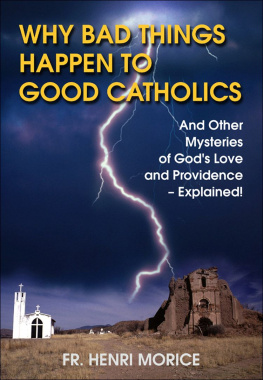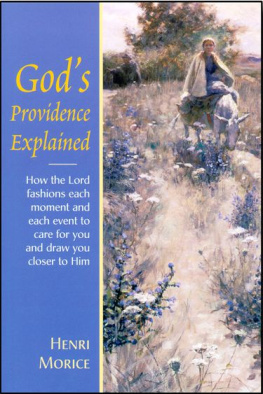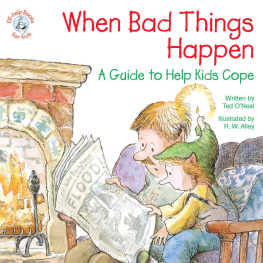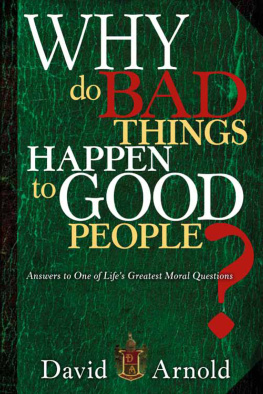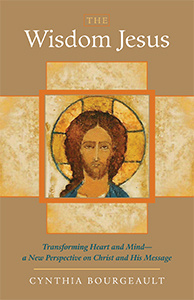Henri Morice - Why Bad Things Happen to Good Catholics
Here you can read online Henri Morice - Why Bad Things Happen to Good Catholics full text of the book (entire story) in english for free. Download pdf and epub, get meaning, cover and reviews about this ebook. year: 2013, publisher: Sophia Institute Press, genre: Religion. Description of the work, (preface) as well as reviews are available. Best literature library LitArk.com created for fans of good reading and offers a wide selection of genres:
Romance novel
Science fiction
Adventure
Detective
Science
History
Home and family
Prose
Art
Politics
Computer
Non-fiction
Religion
Business
Children
Humor
Choose a favorite category and find really read worthwhile books. Enjoy immersion in the world of imagination, feel the emotions of the characters or learn something new for yourself, make an fascinating discovery.
- Book:Why Bad Things Happen to Good Catholics
- Author:
- Publisher:Sophia Institute Press
- Genre:
- Year:2013
- Rating:3 / 5
- Favourites:Add to favourites
- Your mark:
- 60
- 1
- 2
- 3
- 4
- 5
Why Bad Things Happen to Good Catholics: summary, description and annotation
We offer to read an annotation, description, summary or preface (depends on what the author of the book "Why Bad Things Happen to Good Catholics" wrote himself). If you haven't found the necessary information about the book — write in the comments, we will try to find it.
Henri Morice: author's other books
Who wrote Why Bad Things Happen to Good Catholics? Find out the surname, the name of the author of the book and a list of all author's works by series.
Why Bad Things Happen to Good Catholics — read online for free the complete book (whole text) full work
Below is the text of the book, divided by pages. System saving the place of the last page read, allows you to conveniently read the book "Why Bad Things Happen to Good Catholics" online for free, without having to search again every time where you left off. Put a bookmark, and you can go to the page where you finished reading at any time.
Font size:
Interval:
Bookmark:
Why Bad Things Happen to Good Catholics
And Other Mysteries of Gods Love and Providence Explained!
Henri Morice
SOPHIA INSTITUTE PRESS
Manchester, New Hampshire
Why Bad Things Happen to Good Catholics is a reprint of Gods Providence Explained (Manchester, New Hampshire: Sophia Institute Press, 1999) with revised chapter titles. It was formerly published as The Gospel of Divine Providence in 1930 by the Bruce Publishing Company, Milwaukee, Wisconsin, using Rev. J. M. Lelens translation from the French.
Copyright 1999, 2002 Sophia Institute Press
All rights reserved
Printed in the United States of America
Cover design by Lorraine Bilodeau
Cover artwork: Paul Kuroda/Superstock and Morris Collection Mexico Architecture, Gary Morris, Zedcor, Inc./Arttoday.com
No part of this book may be reproduced, stored in a retrieval system, or transmitted in any form, or by any means, electronic, mechanical, photocopying, or otherwise, without the prior written permission of the publisher, except by a reviewer, who may quote brief passages in a review.
Sophia Institute Press
Box 5284, Manchester, NH 03108
1-800-888-9344
www.SophiaInstitute.com
Nihil obstat:
H. B. Ries,
Censor Librorum
Imprimatur:
Samuel Stritch,
Archbishop of Milwaukee
November 17, 1930
Morice, Henri, b. 1873.
[Gospel of divine providence]Gods providence explained : how the Lord fashions each moment and each event to care for you and draw you closer to him / Henri Morice.
p. cm.Originally published: The gospel of divine providence. Milwaukee, Wis. : Bruce Pub., 1930.
ISBN 1-928832-01-6 (pbk. : alk. paper)
ISBN 1-928832-42-3 (pbk. : alk. paper)
1. Providence and government of God. I. Title.BT135.M57
1999 231.5 dc2199-044834What in me is dark Illumine,
what is low raise and support;
That to the height of this great argument
I may assert Eternal Providence,
And justify the ways of God to men.John Milton
Paradise Lost
Editors note: The biblical references in the following pages are based on the Douay-Rheims edition of the Old and New Testaments. Where applicable, biblical quotations have been cross-referenced with the differing names and numeration in the Revised Standard Version, using the following symbol: (RSV =).
Chapter One

How God needs you in His plan for the world
One golden evening, I paused before a bed of daisies, their petals dimmed and dusked with a tinge of amber borrowed from the western sky. As though in admiration, their faces turned toward the setting sun, with something of homage and a mute prayer in their attitude. Each of them, with its golden heart from which white petals radiated, seemed to smile to the heavens.
As I beheld them, thoughts of the relation between God and man flashed into my mind. The sun shines for us all, I mused, but we enjoy its light and heat as though we were each alone. Thus God, who excludes nothing from His solicitude, thinks of all His creatures, even the humblest. He takes particular care of each of them. A consoling thought is this, and a thought that grips us strongly if we meditate on the knowledge of God, on the way in which He communicates Himself to us, and on the plan that He has in each of His works.

God sees at once the whole and the parts
God is a king, incomparable, unique. When a human ruler issues a decree, he is far, indeed, from foreseeing all its applications. He has the general interest in view, but he cannot foresee or attend to the individual needs of all his subjects. They are too numerous; he cannot act as a father to each. Greatly gifted he may be, but his memory is short and his mind limited. If he contemplates the whole, detail escapes him, and vice versa. Examine the typography of a whole page, and you cannot distinguish one line; read a few words, and the rest is but vaguely seen by your eyes. A general who plans a campaign sees only his troops in great masses; the regiments and battalions are to him only units of combat. But when he has to examine the serviceable state, say, of one officer proposed for promotion, then he has in his mind only one individual; relegated to the dim background is the vast army.
Such is the law of the human mind. But to this law, which is caused by the poverty of our nature, the Divine Mind is not subject. There are no limitations in God. God sees with one single glance the whole and the part. Thus is answered the objection opposed to the idea of a particular Providence. Thus is answered the question: How can God busy Himself with us, since it is by laws that He governs us?
The difficulty is only apparent. To Infinite Wisdom, there is no opposition between the general and the particular. It is the same act for God to conceive a law and to think of all the cases to which it will be applied. It is by the selfsame act that He rules the universe and orients toward his destined end the child just born.

God has known you from eternity
And see the beautiful consequences of this doctrine.
First, it implies the pre-existence of each one of us in the Divine Thought. We may say that during the centuries that preceded our birth, there was no question of our own little personality. As a matter of fact, at the time of Julius Caesar, no one foresaw our passage upon this earth, or our history, or our destiny.
And yet at that faraway epoch, and ages before, there was one who was interested in us. God had already set the horologe that would register the hour of our birth and had fixed our precise locus in the vastness of space. From all eternity, He has conceived all futurity. Each one of those whom He calls into existence represents one aspect of His infinite perfections. Each one of them answers a creative idea, particular and eternal. Before birth, therefore, I existed not only as a hope in the fecundity of my race, but also as an actual form in the Divine Thought.
In the depths of His eternity, God has thought of us, and among the numberless generations that are to people the earth, He has called and has chosen His own. He knows their number and their names. On the day of the final reckoning, when the just will be separated from the wicked, Christ will tell them, Come, ye blessed of my Father, possess you the kingdom prepared for you from the foundation of the world.
How fearful is this mystery of predestination! It is true that our salvation is absolutely in our hands, since it depends on our fidelity to divine grace. Gods foreknowledge does not interfere with our liberty. Nevertheless, our destiny is settled forever. Shall I be among the saved or the lost? God knows the answer.

Christ knew you even during His earthly life
To redeem those whom He had chosen, God decided to send His Son into the world. Christ, who is infinite knowledge, knew each of those who were to rejoice over His coming and profit by His Sacrifice. It is their desires and their pleadings that have drawn Him down to earth. With a profound compassion, He has heard their cry of distress and has answered their appeal for the divine Messiah. Drop down dew, ye heavens, from above; and let the clouds rain the Just One. Let the earth be opened and bud forth a Savior.
Without any pride, I may, therefore, believe that I am one of the causes of the Incarnation. Infinitesimally, but positively and really, I have influenced the divine decision. And when the Word took flesh in the womb of a Virgin, He could have told me, For thee I have done this.
Next pageFont size:
Interval:
Bookmark:
Similar books «Why Bad Things Happen to Good Catholics»
Look at similar books to Why Bad Things Happen to Good Catholics. We have selected literature similar in name and meaning in the hope of providing readers with more options to find new, interesting, not yet read works.
Discussion, reviews of the book Why Bad Things Happen to Good Catholics and just readers' own opinions. Leave your comments, write what you think about the work, its meaning or the main characters. Specify what exactly you liked and what you didn't like, and why you think so.

